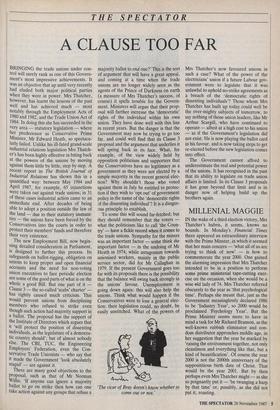THE SPECTATOR
A CLAUSE TOO FAR
BRINGING the trade unions under con- trol will surely rank as one of this Govern- ment's most impressive achievements. It was an objective that up until very recently had eluded both major political parties when they were in power. Mrs Thatcher, however, has learnt the lessons of the past well and has achieved much — most notably through the Employment Acts of 1980 and 1982, and the Trade Union Act of 1984. In doing this she has succeeded in the very area — statutory legislation — where her predecessor as Conservative Prime Minister, Mr Edward Heath, so spectacu- larly failed. Unlike his ill-fated grand-scale industrial relations legislation Mrs Thatch- er's has been highly effective in biting back at the powers of the unions by moving against them little by little, step by step. A recent report in The British Journal of Industrial Relations has shown this in a quantified way: between May 1984 and April 1987, for example, 65 injunctions were taken out against trade unions; in 31 of these cases industrial action came to an immediate end. After decades of being able to adopt a position outside the law of the land — due to their statutory immuni- ties — the unions have been forced by the Conservatives into the courts in order to protect their members' funds and therefore their very existence.
The new Employment Bill, now begin- rung detailed consideration in Parliament, is designed to further this process. Its safeguards on ballot-rigging, obligation on unions to keep proper and open financial accounts and the need for non-voting union executives to face periodic election are some of the good parts of what is on the whole a good Bill. But one part of it — Clause 3— the so-called 'scabs' charter' — has rightly caused much criticism. This would prevent unions from disciplining members who refused to strike even though such action had majority support in a ballot. The proposal has the support of the Institute of Directors which argues that it 'will protect the position of dissenting individuals, as the legislature of a democra- tic country should'; but of almost nobody else. The CBI, TUC, the Engineering Employers' Federation, even the Con- servative Trade Unionists — who say that it made the Government 'look absolutely stupid' — are against it. There are many good objections to the proposal, such as that of .Mr Norman Willis: 'If anyone can ignore a majority ballot to go on strike then how can one take action against any groups that refuse a majority ballot to end one?' This is the sort of argument that will have a great appeal, and coming at a time when the trade unions are no longer widely seen as the agents of the Prince of Darkness on earth (a measure of Mrs Thatcher's success, of course) it spells trouble for the Govern- ment. Ministers will argue that their prop- osal will further increase the 'democratic' rights of the individual within his own union. They have done well with this line in recent years. But the danger is that the Government may now be trying to go too far, and could well find that its Clause 3 proposal and the argument that underlies it will spring back in its face. What, for example, of the view widely, held by opposition politicians and supporters that the Conservatives have no legitimacy as a government as they were not elected by a simple majority in the recent general elec- tion? Why shouldn't those who voted against them in July be entitled to protec- tion if they wish to 'opt out' of government policy in the name of the 'democratic rights of ihe dissenting individual'? It is a danger- ous principle to establish. To some this will sound far-fetched; but they should remember that the voters — what the politicians like to call 'the Coun- try' — have a fickle record when it comes to the trade unions. Sympathy for the miners was an important factor — some think the important factor — in the undoing of Mr Heath in 1974; while antagonism towards unionised workers, mainly in the public service sector, did for Mr Callaghan in 1979. If the present Government goes too far with its proposals there is the possibility that the balance will swing back strongly in the unions' favour. Unemployment is going down again: this will also help the unions. Think what would happen if the Conservatives were to lose a general elec- tion: their legislation could, no doubt, be easily unstitched. What of the powers of 'The vicar of Bray doesn't know whether to come out or not.' Mrs Thatcher's now favoured unions in such a case? What of the power of the electricians' union if a future Labour gov- ernment were to legislate that it was unlawful to uphold no-strike agreements as a breach of the 'democratic rights of dissenting individuals'? Those whom Mrs Thatcher has built up today could well be the over-mighty subjects of tomorrow, to say nothing of those union leaders, like Mr Arthur Scargill, who have continued to operate albeit at a high cost to his union — as if the Government's legislation did not exist. He is now playing the ballot card in his favour, and is now taking steps to get re-elected before the new legislation comes into effect.
The Government cannot afford to underestimate the real and potential power of the unions. It has recognised in the past that its ability to legislate on trade union affairs is limited. In its Clause 3 proposals it has gone beyond that limit and is in danger now of helping build up the brothers again.


































































 Previous page
Previous page